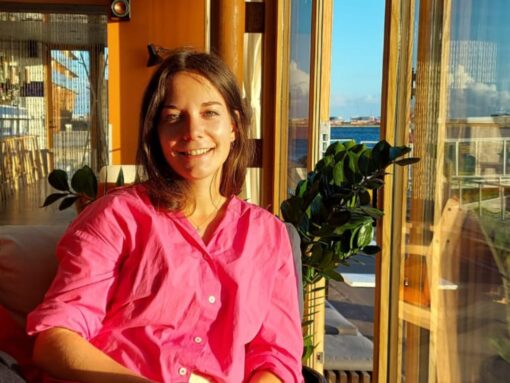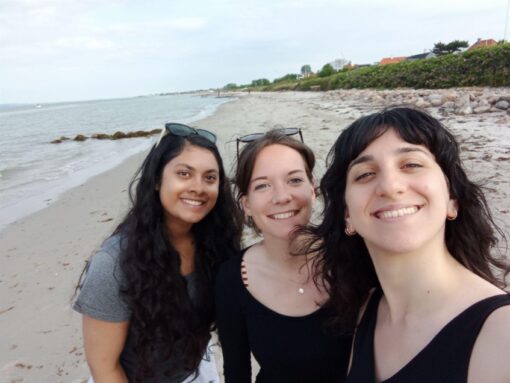
As I arrive in Stockholm in the early afternoon, the sun is already setting. Cold air blows into my face, the only feeling of warmth provided by the twinkling Christmas lights that decorate almost every building in the city. It is the week leading up to the award ceremony on the anniversary of Alfred Nobel’s death on 10 December, the “Nobel week”. And it is packed with events. As I make my way to the hotel to warm up, I notice small quotes projected onto bridges and houses in the old city.
“Now, please, with me, close your eyes. And imagine the world as it should be,”
says one of them, quoting last year’s winner of the Nobel Peace Price, Maria Ressa. For a brief moment I try it out, closing my eyes, and as I open them again, my gaze falls upon a spectacle of lights dancing across the Stadthus right in front of me. It is the Nobel Week Lights, an art installation illuminating buildings all around Stockholm throughout the long nights.
Safely at the hotel, I take a look at the schedule ahead. It is a busy week for the laureates. Press events and public lectures, even a reception at the Austrian embassy await Professor Zeilinger before the big award ceremony at the end of the week. And we can follow along.
The first day starts early with an official press conference for the Nobel laureates in Physics and Chemistry as well as the three winners of the Nobel Prize in Economic Sciences. As I walk up to the Royal Swedish Academy of Sciences, an elegant red brick building, small flames line the way up to the entrance. Inside, the rooms are lit by impressive chandeliers, the walls covered with portraits of Nobel laureates from all times. I recognise the room from the announcement of the winners, just a few months ago, and memories from a day of pride and celebrations at the University and IQOQI Vienna resurface. Now, however, it is not the Nobel committee sitting at the long desk on one side of the room, but the nine laureates themselves.
“What is your prognosis for quantum technology?,” a reporter asks the Physics laureates and Professor Zeilinger explains that, to him, the usefulness of his experiments was a complete. Motivated by fundamental questions, his research seemed to have no practical applications for a long time and he would not have been able to predict its outcomes 20 years ago. Similarly, it is difficult to predict what will happen 20 years from now. “What we can predict,” he conjectures, “is that when a sufficient number of sufficiently clever people work together, something often emerges. Having said this, it is very important, that we do not to overlook that there is a future beyond the present future. You need to develop new fundamental experiments, new ideas, to open up possibilities for applications at a later time.”
While at the press conference, the focus is on the future of quantum technologies, the next day provides clearer insight into its past. At Stockholm University’s Aula Magna, hundreds of people have gathered to watch the Nobel Prize Lectures in Physics, in which the three Physics laureates take the audience through the fundamental experiments that ultimately brought them to Stockholm. Their talks trace the path from an early debate on the interpretation of quantum physics, initiated by Albert Einstein himself, to a remarkable set of experiments, proving with increasing certainty that quantum mechanics evades the intuitions of even the brightest minds. When the Nobel laureates get together for a last photo at the end of their talks, the audience rewards them with a standing ovation – a rare honour for a physicist.

With the lecture held, the celebrations can begin. First up is a reception at the Austrian embassy. An elegant but not particularly striking building from the outside, the Austrian embassy impresses with its interior. The luscious red carpets, heavy drapes and plush-covered chairs immediately take its visitors back to the old days. The guests include Austrian expats, renowned physicists, press representatives and members of the embassy. A colourful mixture that allows for delightful conversations. When Professor Zeilinger enters, we all stop chatting and listen to the ambassador introducing her guest of honour. A short speech by the Nobel laureate follows. In it, he stresses the role of science as an international endeavour that builds bridges between different countries. After a round of applause, a pair of drapes opens and reveals an impeccably set table with coffee and a mix of Austrian and Swedish sweets. The atmosphere is relaxed and I can even take a selfie with the Nobel laureate himself.
Quite the opposite atmosphere prevails at the official award ceremony the next day. Everything is scheduled to the minute and admission to the Konserthuset, where the event takes place, severely limited. The reporters and I get a short glimpse of the laureates in white tie at the hotel lobby before they get carried off in matching cars. Even though ordinary PhD candidates such as myself, may not participate in the actual ceremony, I follow them to witness the spectacle from the outside at least. As I get to the site, the streets are blocked and a huge crowd has gathered around the blue concert hall. Photographers have set up cameras with gigantic lenses in order to get a shot of the laureates in front of the building. Once they have disappeared out of sight, I go to the nearest coffee place to watch the livestream of the ceremony. Ironically, close to the scene, yet not different from the many viewers abroad, I watch the laureates enter the stage. Traditionally, the Physics Nobel Prize is awarded first – this year “for experiments with entangled photons, establishing the violation of Bell inequalities and pioneering quantum information science.” With respect to the experiments of Professor Zeilinger and his collaborators, the speaker adds that
“importantly, they demonstrated how the elusive concept of quantum entanglement can be useful. This was a giant leap from Zeilinger’s Austrian predecessor Schrödinger and it is remarkable how the circle began in Austria and was closed in Austria”.
One by one, the physics laureates now step forward. Accompanied by the applause of over a thousand guests and a fanfare played by the orchestra, Alain Aspect, John Clauser and Anton Zeilinger receive the Diploma and the golden Nobel Medal from His Majesty, the King of Sweden.

This spectacular scene marks the height of Professor Zeilinger’s career and also the end of the Nobel week in Stockholm. As I make my way back to the hotel, I pass by the Stadthus one more time. Once again, it is lit in magnificent colours. Inside, the laureates, together with over a thousand carefully selected guests, must be convening for the Nobel banquet to celebrate a day honouring great achievements, both personally and of science as a whole.



